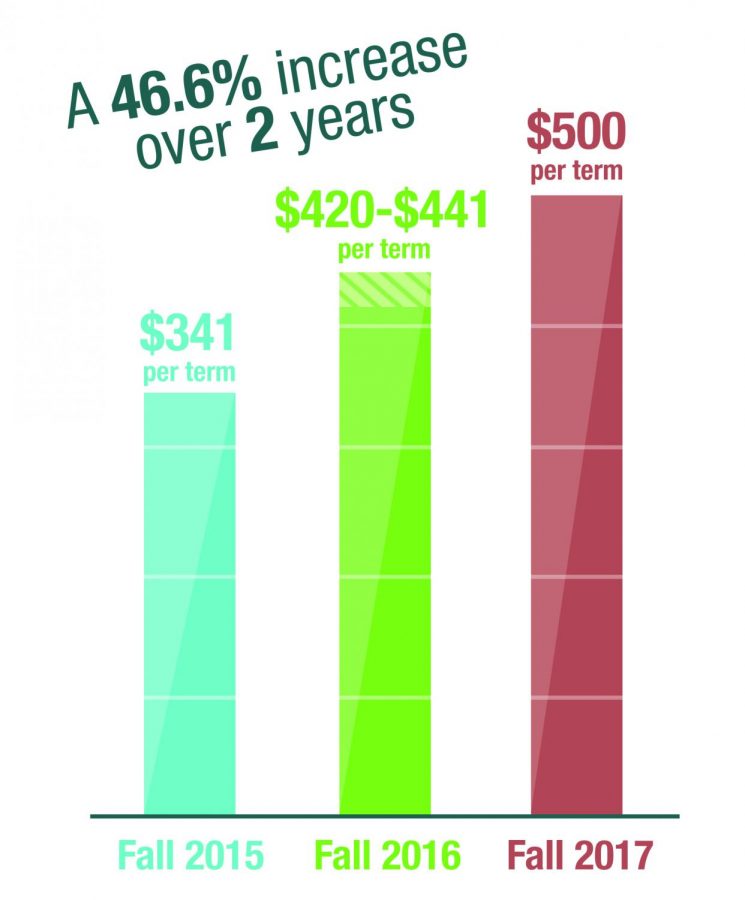Oregon State University Honors College to increase differential tuition
January 25, 2016
http://honors.oregonstate.edu/
The faculty of the University Honors College is putting forward a proposal to implement an increase in UHC differential tuition.
Just over a week ago, the UHC sent an email to all of its students explaining the proposal and the primary reasons for it. The email also invited students to two public discussions of the proposal on Wednesday and Friday of last week.
In the email and discussion session, Toni Doolen, Dean of the Honors College, explained that about 92 percent of differential tuition fees pay for faculty members to teach honors classes. Because the UHC only has one faculty member devoted solely to teaching honors courses, all of the others have to come from the other departments on campus.
However, in order to get a professor to spend time teaching an honors college class, that department needs to find a replacement to cover the non-honors course that they would otherwise teach. The remaining differential tuition money, according to Doolen, goes toward maintaining UHC resources like the SLUG and student-faculty mixers. The present amount of differential tuition is not sufficient to support UHC operations.
At the first public discussion, Doolen explained that the proposed increase, if approved, will start by increasing differential tuition from $341 per term to $420-$441 per term Fall 2016. Then a second increase from $420-$441 per term to $500 per term will occur in Fall 2017, and will remain there for as long as possible.
“We know that this is a big change, which is why we are taking this so seriously,” Doolen said.”
However, for UHC students like Kelsey Cronin, a UHC freshman studying biology, the increase in UHC differential tuition presents an impassable barrier and may not be able to stay in the Honors program.
“I was flooded with rage and anger (upon reading the email announcement),” Cronin said. “It just feels like a slap in the face—it never ends.”
Cronin came to OSU because she was inspired by all of the research conducted at OSU. According to Cronin, she was drawn to the UHC program because of the smaller class sizes and opportunities to connect with faculty. However, Cronin expressed doubt in her ability to stay in the UHC as a result of the proposed tuition increase. However, according to Cronin, the money itself is not the entirety of the problem, some of it is the lack of inclusion and apathy towards the tuition increase.
The lukewarm response was very frustrating for Cronin when approximately seven students were at the first discussion session and attendance was similarly low at the second.
“My peers aren’t here,” Cronin said during the first discussion session. “My peers weren’t affected when I tried to get them to come with me. Right now, (the UHC) certainly doesn’t feel like an inclusive community.”
Student feedback and engagement, according to Doolen, is an important part of this process. According to Doolen, approximately 35 percent of UHC students fall into the categories of medium to high financial need.
Before crafting the proposal last year, UHC faculty met with focus groups of UHC students in order to determine the best course of action. The focus groups indicated that the small classes and other services provided by the UHC are important and that an increase in differential tuition would be the best course of action.
UHC faculty met earlier this academic year with the newly founded UHC Student Leadership Circle. According to Claire Kiefel, a sophomore studying biology and the Representative of the College of Science for the UHC Student Leadership Circle, it’s a difficult problem.
“My response is that it’s not necessarily a necessary evil, but it’s something that’s necessary in order to maintain the number and quality of faculty teaching classes.”
According to Kiefel, the Student Leadership Circle was responsible for helping UHC faculty edit the message and presentation shared with students to explain the proposal.
Cronin said that she hopes that more financial aid tools will be available to UHC students in the future. According to Cronin, the existing differential tuition grant alone is not an adequate financial aid resource for students. According to Doolen, she and the UHC faculty have already begun discussing ways to construct financial aid resources for future students.















































































































